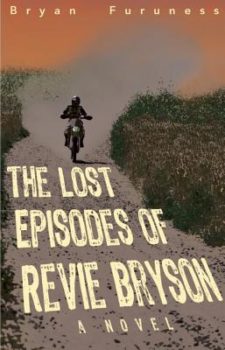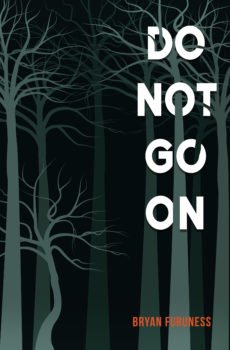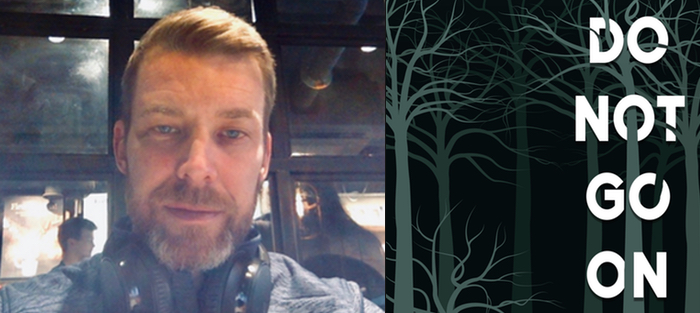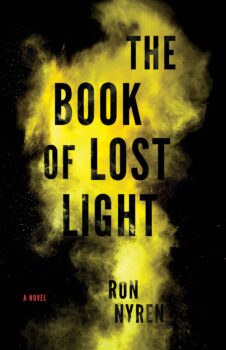As a long-time fan of Bryan Furuness’s fiction—his short stories, and his novel The Lost Episodes of Revie Bryson—I was delighted to hear several months ago of the forthcoming release of his second novel, Do Not Go On (Black Lawrence Press). Bryan graciously sent me a manuscript copy, and soon we were thick into a conversation about his novel. Do Not Go On shakes the genre of thriller into a suspenseful something else: a book that keeps you turning the pages while it simultaneously fills you with dread and encourages your stubborn hopes. And it’s seasoned just enough with Furuness’s empathetic and slyly humorous take on humanity.
In addition to his two novels, Bryan is also the editor of the anthology My Name was Never Frankenstein: And Other Classic Adventure Tales Remixed, and the co-editor (with Michael Martone) of Winesburg, Indiana. His stories have appeared in New Stories from the Midwest, Best American Nonrequired Reading, and elsewhere. He lives in Indianapolis, where he teaches at Butler University.
Interview:
Philip Graham: Your first novel, The Lost Episodes of Revie Bryson, is one of my favorite coming-of-age novels. It’s a smart and funny—and at times heartbreaking—book, one with a kind of post-modern twist, and Revie is such an imaginative character—what a strange and winning brain that young man has! Your second novel, Do Not Go On, is something else again—a thriller! A kind of thinking-person’s thriller, with careful characterization wedded to some serious plot thrills. Anyway, this is a very roundabout way of finally asking: why a thriller?
Bryan Furuness: A few years ago, I heard the editor Gary Fisketjon say that he likes books that are “not boring, and not dumb.” He was talking about work that blurs the boundaries between genre fiction and literary fiction. Books that are suspenseful and insightful, fast-paced and beautifully crafted on every line. Books like The Zero, or Winter’s Bone, or Night Country. I like those kinds of books, too. So I tried to write one.
 But here’s the weird thing: as different as this book seems from my first novel, they’re really companion pieces. I’ll try to explain in a way that doesn’t spoil either book.
But here’s the weird thing: as different as this book seems from my first novel, they’re really companion pieces. I’ll try to explain in a way that doesn’t spoil either book.
At the end of the first novel—The Lost Episodes—the family is about to leave town and make a fresh start somewhere else. They think they’re moving on; a skeptical reader might say they’re running from their past and hoping it doesn’t catch up. The second novel opens with a man and his daughter in the tiny town of Morocco, Indiana. They’re in witness protection, and the whole deal is that they have to leave their old lives, their old selves, behind. This is—surprise, surprise—a struggle.
So I guess the second book was my way of thinking about the questions raised by the end of the first book. What happens when you try to start fresh? How will the past haunt you? Can you ever really become someone different? Not that I was aware of any of these connections at the beginning of the project. It wasn’t until the third or fourth draft that I figured out why I was writing this book.
Oh, I love this story! In a way, you’ve written a sequel, but a kind of conceptual sequel, not a sequel with the same characters. And the fact that you didn’t realize this until you were several drafts along reaffirms my belief that novel writing demands one’s deepest self rising to the surface, the hidden seeking voice. Which doesn’t occur by simply snapping your fingers, it takes time.
Time, and a certain comfort with ignorance early in a project. “To be able to stand not knowing long enough to let something alive take shape!” as Lynda Barry puts it in What it Is. It’s like the old story about Proteus, the Old Man of the Sea. When Menelaus grabbed him, Proteus changed forms again and again—lion, snake, leopard, pig, water (!)—but Menelaus hung on until Proteus was like, Fine, you win, and assumed his true form.
That’s basically my writing process.
About that new life in the witness protection program: it’s not going well. Ana, who is just the kind of sensitive, intelligent teenager that always has trouble fitting in at high school, is already plotting a life beyond her current isolation. Meanwhile, her dad, who back home was “a tender wiseass, a charm monster,” has here succumbed to paranoia and perches in a tree near their new home, rifle at the ready, afraid he and his daughter will inevitably be tracked down by the baddies of his past. The situation is inherently unstable, and the reader immediately feels that anything could happen.
You should have written the jacket copy. What a gripping summary—it made me think, Oh no, what’s gonna happen? even though I know.
Hopefully, “anything could happen” takes on a couple different meanings in this book. One meaning is specific to this family and their trouble: how are they going to get out of this jam? The other meaning is more universal. “Anything could happen” is the situation for nearly every seventeen-year-old, right? Graduation is coming up fast, and you’re about to rewrite your life, ready or not.
Right now my older son is coming up to that precipice and he’s deciding where he’s going to leap. He’ll be a different person when he lands, I know. In a way, going off to college—or joining the military, or moving out on your own for the first time—is a little like going into witness protection. Not in the sense of secrecy (though maybe for some of us it is?), but in the sense of forging a new identity in a new place.
I don’t believe that you can totally shed your old self (sorry, family from my first novel), but neither do I believe that identity is perfectly portable. Earlier I said that my son would be a different person when he landed. The jump itself changes you.
Which reminds me of Ana’s friendship with Logan. Two outsiders who form a tenuous bond on the basis of having no one else to turn to in the sometimes toxic air of a high school’s social hierarchy. They’re both about to graduate, on the edge of that jump into the future, but they’re not really comfortable with themselves (and they each have their secrets), so it’s difficult for them to be comfortable with each other. They need each other, though, as we’ll see later in the novel. Notice, by the way, how careful I’m trying to be about spoilers? We’re talking about a thriller, after all!
 Oh, Logan. I feel for that guy, I really do. Maybe that’s dumb or gauche to say about your own character, but it’s true. He’s in such a tough spot. Rural Indiana in the 90’s is no place for a sexually confused kid like Logan. You could call him an outcast, except he’s not actually cast out. He’s stuck in this town, this school, this family with his dickhead brother. Nowhere to run, nowhere to hide—a lot of small-town kids feel this way, but Logan feels it more than most.
Oh, Logan. I feel for that guy, I really do. Maybe that’s dumb or gauche to say about your own character, but it’s true. He’s in such a tough spot. Rural Indiana in the 90’s is no place for a sexually confused kid like Logan. You could call him an outcast, except he’s not actually cast out. He’s stuck in this town, this school, this family with his dickhead brother. Nowhere to run, nowhere to hide—a lot of small-town kids feel this way, but Logan feels it more than most.
“Nowhere to run, nowhere to hide”—sounds like most of the characters in your novel, in one way or another! Or maybe I should say that they all share deep vulnerabilities, an inner unease that fuels much of the plot.
Maybe that’s the driving force of all literary fiction—inner unease. Whereas genre fiction is driven more by external unease. Something bad is about to happen, and I have to stop it, for example, or: Something bad has happened, and I have to solve it. That’s reductive, but not, I don’t think, all the way wrong. And to tie this back to my first answer, I want to read and write books with both kinds of unease. I want characters who are struggling toward harmony within themselves and in their world.
I think you’ve done that tightrope-walking synthesis with real aplomb. There are so many characters in Do Not Go On who engaged me as the tension of their inner lives fueled their fates (and I love how the structure of the novel goes back and forth between their stories). I’d like to talk about a few of these characters, beginning with Ana’s dad, Ben. Before she was born, he made a dirty deal for love. He hoped for a quiet life, but that one decision essentially set in motion years later the cascading events of the novel.
With Ben’s decision, I’m stealing even more from other genres—folk tales and fairy tales this time. In the world of a folk/fairy tale, the most dangerous force might be desire, especially desire to rise above your station. Voicing that desire is the cue for some shady character to sidle up and say Have I got a deal for you. And that deal, of course, always has a hook buried deep inside it. See, for instance, “The Devil and Daniel Webster.” Though the weird thing about that old story, the thing that people tend to forget is that Webster isn’t the one who makes the deal with the devil. It’s a farmer, Jabez Stone, who makes the deal. When it comes time to pay up, Jabez gets Daniel Webster to represent him as his lawyer—to save him, essentially.
Like that farmer, Ben finds himself well and truly gaffed. Whether he realizes it or not, he’s not getting off that hook by himself. He needs someone to save him.
Well, speaking of possible saviors (besides his own feisty daughter), there’s Peter Crews (AKA Droop). Known in town as a retired railroad worker, he’s actually a U.S. Marshall, assigned to protect Ben and his daughter. Pete sees himself as a “glorified babysitter.” He’s burdened with more than a few of his own personal problems, and the occasional phantom pain. Despite his good intentions, throughout the novel he doesn’t inspire the reader’s complete confidence.
 You mean, if you had your pick of marshals to look out for you, you wouldn’t immediately go for the one nicknamed after Droopy Dog?
You mean, if you had your pick of marshals to look out for you, you wouldn’t immediately go for the one nicknamed after Droopy Dog?
I can’t help but love Droop. Everyone in this world underestimates him. Everyone blows him shit, and he absorbs it, and just keeps moving. He’s a force of nature—not like a hurricane, but like a shlubby glacier. He cares about Ana, and keeps caring, even when she wants him to stop, even when that caring makes him look foolish or puts him in danger. Like a father—even though Ana is not his daughter, even though his own daughter is gone.
One of my favorite writers is Lewis Nordan. His last book was a memoir that spanned his life, including the death of his father and the death of his own son. In Nordan’s words, he went from being “a fatherless child to a childless father.” That’s Droop, I think: the childless father.
Which is perhaps why Ana, the (essentially) fatherless child, reluctantly puts up with him. And there’s something about Droop’s bouts of self-doubt that seem to serve as a contrast with another linchpin character, Zeeshan, who suppresses his self-doubt. He’s made his own deal with the devil, in order to save his fellow Kashmiris, to smuggle them out of a fraught political reality and bring them to a better life in the U.S. But he must un-see much in order to accomplish this.
In a way, this novel is about the stories we tell ourselves and the stories we tell others. For most of his career, Zeeshan has told himself that the ends justify the means. But by the time the novel opens, he’s ready for a different story. He wants to change those means, starting with himself. When we meet Zee, he’s a hitman who has decided to stop killing people. The only problem is that he hasn’t told his boss, who wants him to take care of their problem with Ben.
“Their problem with Ben.” I think I’ll leave that plot point alone, and let prospective readers find out for themselves! While plot is important to Do Not Go On—it hums right along—those stories your characters tell themselves are what make your thriller thrilling in a deeper way. I can’t imagine myself as a Jack Reacher or a 007—I follow their adventures as an outsider. But I can indeed see myself in Ben, and Droop, and Ana and even, God help me, Zeeshan; can feel their inner conflicts reflect my own.
And just like that, you’ve brought us back to the pleasure of books that straddle the line of genre and literary fiction. In the best of those books, the pleasure feels paradoxical. While the external features of the plot and the characters are often alien to the reader’s experience, the internal landscape is familiar. So even as these books carry us away from our own stale lives, they take us deeper into our own experience—and both of those actions are enlivening. I can’t tell you how gratified I am to hear that my book has given you a dose of that pleasure.





